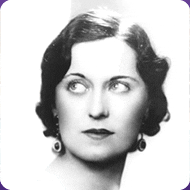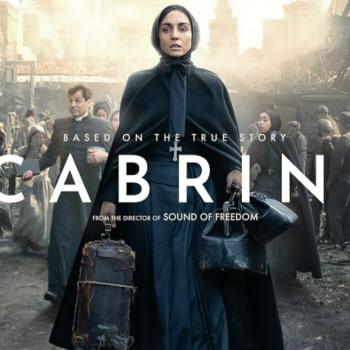The notice announcing Academy Award winning filmmaker Alex Gibney’s new documentary “Park Avenue: Money, Power and the American Dream” included a photo of 740 Park Avenue, a luxury apartment building in Manhattan. I was rendered completely curious so I replied immediately to the publicist and requested a screener. (Gibney’s previous films include “Taxi form the Dark Side” and “Enron: The Smartest Guys in the Room”).
You see, my great aunt lived at 740 Park Avenue for almost thirty years. Her name was Lydia O’Leary (Reeves) and she made her fortune when she invented a complexion cream that could conceal birthmarks and scars, Covermark. The make-up completely concealed the port wine stain birthmark that covered half her face. O’Leary patented it in 1932 after a federal appeals court of eight judges in Washington overturned previous denials when she demonstrated its use on her birthmark. A couple of years ago I bought the book “740 Park Avenue: The True Story of the World’s Richest Apartment Building” by Michael Gross (2005; Broadway Books) and sure enough, Aunt Lydia has almost two pages in the section entitled “New Money.” Aunt Lydia was also written up in Readers’ Digest, “Modern Miracle” by Polly White, (June 1939) and I have a copy.
This book inspires the film and Michael Gross is one of the key experts in this informative and somewhat chilling documentary that explores the “consequences of wealth and consequences of inequality” in the United States today.
Aunt Lydia’s apartment was sold in 1985 to pay estate taxes after her death and no mere millionaire bought it; a billionaire did. Some of Aunt Lydia’s neighbors could still there I suppose but a whole new class of moneyed folks now owns most apartments at 740 Park: billionaires. Lydia O’Leary married late and never had children. She was my mother’s aunt and my godmother. Not long before she died her will was revised and all but a handful of her many relatives received anything and they had to sue for it. My mom just filed away the papers.
http://www.youtube.com/watch?v=1-OKyju06e4
“Park Avenue: Money, Power and the American Dream” is a documentary that compares and contrasts the development of Park Avenue in midtown Manhattan with the appalling lack of development of Park Avenue ten minutes away in the South Bronx. Why? Because “people who own apartments at 740 Park Avenue make up America’s ruling class” and people who live along Park Avenue in the South Bronx “make up the poorest congressional district in the United States.” 40% of the 700,000 people there live below the poverty level. In the last 30 years the people “have seen their wages fall and the cost of everything else go through the roof. They’ve lost their jobs in a recession caused by bankers across the river. They’ve watched their children struggle in failing schools and they are less well off than they were a generation ago.”
Gibney notes that the upward mobility required to access the American dream is stymied due to the unregulated relationship between big money and politics and observes that the deep moat signified by the Harlem River that separates both parts of Park Avenue, has become a barrier to achievement.
“There are more billionaires living at 740 Park Avenue than anywhere else in America” says Gross. These include John Thane, the CEO who presided over the downfall of Merrill Lynch, Ezra Merchan who was the “feeder” to Bernie Madoff; David Koch is the richest person in the building (who with his brother Charles donates more money to Congressman Paul Ryan than any other member of Congress), and Steve Schwartzman “who is the poster child of capitalistic greed in the last ten years.” Gross notes that Schwartzman is “one of the most prominent CEOs when it comes to lobbying for tax policies that favor the ultra rich.”
Park Avenue, the film says, “is where the upper crust, the ultra rich live. This street is about a lot more than money. It’s about political power. The rich here haven’t used their money just to buy fancy cars, private jets and mansions; they’ve also used it to rig the game in their favor. For the last 30 years they have enjoyed unprecedented prosperity from a system that they increasingly control.”
Gibney, with the input of economists such as Jeffrey Sachs, social theorists, journalists, and representatives from some of the political organizations founded by or backed by the Koch Brothers, then proceeds to look at the last three decades and how corporate America’s influence swelled to the point of dominating the political process.
The film does not even try to be bipartisan because it is offering an uber look at a segment of the U.S. population few are familiar with – the ultra wealthy who are predominantly Republican and Libertarian; it will be new to most people because here we see this distant but dominant and powerful economic reality all under one roof as it were.
For me the most compelling elements of this courageous film are
1) The seamless connection Gibney makes between the philosophy of Ayn Rand and the Republican and Libertarian parties (it includes footage of an interview between Mike Wallace and Ayn Rand);
2) The connection Gibney makes between the extremely rich and the Tea Party. Jane Mayer, an investigative journalist and staff writer for The New Yorker, says “If you can take the resentment of the middle class and point it downward rather than having it point upward to the people on the top of the 1% who are walking away richer than ever, then you can succeed politically”;
3) The “carried interest provisions” of the tax code that both Republicans and Democrats refuse to reform as it assured the wealthiest a standard 15% income tax while firemen in New York, where Senator Charles Schumer (D-NY), who sits on the Senate Finance Committee and the subcommittee on Taxations, IRS Oversight and Log-term growth serves his constituents on Wall Street, the film says, but public servants, like firefighters in his district, pay double that rate.
4) Using the 1975 “School House Rock” cartoon “I’m Just a Bill” Gibney illustrates how bills became law until lobbyists rigged the system in favor of corporations beginning in the 1980a. Now laws are almost solely written by lobbyists, paid for by major corporations or organizations, that make a financial accommodation to politicians so their interests are served by proposed legislation. This is a very chilling part of the documentary.
5) The influence of the Koch Brothers is too vast to recount here; the film lists the non-profit organizations they influence through money or have founded themselves to influence the political process and education (I saw Christendom College and Loyola of Chicago and New Orleans on the list of Koch donation recipients but I had to pause the scene and then watch it frame by frame.) “Americans for Prosperity” is their latest political influence endeavor and the film states that it is their link to the Tea Party.
6) A clear picture of how corporations became the government in the last 30 years. This is putting it rather starkly but have a look. The transition is almost complete and it is marketed by the extremely wealthy as “freedom” – freedom from taxes, freedom to pollute, and freedom from responsibility.
And by the way, Representative Eric Cantor (R-Virginia), Paul Ryan (R-Wisconsin) and Steve Swarzman have all been saying that 45% of Americans don’t pay (income) taxes; Romney upped it to 47% and though he doesn’t seem to have originated the statement, his statement brought this perspective about the American people to our attention.
And on and on the film goes.
The film spends quite a bit of time analyzing the negative consequences of Senator Paul Ryan’s 2013 budget “Path to Prosperity” on the poor and the nation because it would “shred the safety net” of the poor and middle class who are jobless and homeless – or even if they have jobs and it would add trillions to the national debt. Economist Jeffrey Sachs comments, “It is absurd that there is legitimate economics behind this plan.”
Jacqueline Bouvier Kennedy’s Irish immigrant grandfather James T. Lee built 740 Park Avenue. Ground broke in 1929 just as Wall Street crashed Then with a consortium he completed the building and it went on to thrive.
“1% of the 1% are concentrated in New York’s 740 Park Avenue” and it has become “the epicenter of the masters who ruled the world. It is currently home to more billionaires than any other building in the United States.” It used to be home to oil magnates but now the majority of people there are hedge fund guys who are the equivalent of the oil people from the 30s. “They rule the world, they are CEOs of the largest companies of the world.”
Jacob Hacker, author of “Winner Take All Politics: How Washington Made the Rich Richer and Turned It’s Back on the Middle Class” begins the conversation about morality and the current U.S. economic political system: “This extreme accumulation of wealth at the top is not just about hard work – it’s about wealthy interests using the political system to rig the rules in their favor.” The inherent morality of capitalism, the way it is lived in the U.S. today is that of Gordon Gekko (in the film”Wall Street”): “Greed is good” and “Making money equals freedom.”
The morality of the rich is determined by what you have to do to get richer and richer and richer.
The film concludes:
“Real capitalism is a game played for keeps, for every winner there are lots of losers. Wealth is created but so is poverty. Without popular democracy all the gains of our economy will go to the top. Twisting politics and buying politicans is how the richest get richer. They work the system.
“As long as our political leaders depend on the rich to get elected and stay in office they will write laws to protect the castles of wealth and power, on the other side of this (Harlem) river than has become a deep and forbidding moat.”
I first watched this film about three weeks ago and I wondered why it was not released before the election. It would have given people a lot to think about when considering the difference between the Republicans and the Democrats.
But people are smarter than we think, I guess. It would seem that they intuited that one party was not playing fair and “rigging the system” and that the rigging had nothing to do (good) with them.
Perhaps the reason Romney lost the election wasn’t for any other reason than Americans refuse to be bought, used, or played with by the extremely rich who only care about themselves. The film does not let the Democrats off the hook, however, and makes it known that their inaction and failure to change legislation or “bail out” those who lost everything in the mortgage crisis but saved the corporations instead, continues to hurt people. Sometimes the line between Democrats and Republicans is not all that clear.
The film is a call to clarity, for transparency, participation in society, and a morality that goes beyond getting rich and wealthier at any cost.
Schwartzman, Thane, Ryan, the Koch Brothers, Schumer all declined to be interviewed despite multiple requests is the closing message of the film.
“Park Avenue: Money, Power and the American Dream” is a riveting contemporary economics master class.
I know I am late in posting this but if you can, check out the film on your local schedule or it on Hulu
My great aunt Lydia O’Leary (c. 1903 – 1985) was bullied as a child because of her birthmark. She became very wealthy and did much good with her invention after World War II and the Japanese Government honored her for the assistance she gave to people who were burned by the effects of the atomic bombs dropped on Nagasaki and Hiroshima. But she was no so approachable and took well to wealth even though her own father was an Irish immigrant who drove a horse-drawn cab to support a very large family. When I received the habit in 1968 she sent me a $50 check – or rather her secretary did. I still have the note. After Aunt Lydia had the stroke I was able to visit her because by then I was a novice and young sister stationed in New York. She was not able to speak but she seemed to know who I was.
I don’t think Aunt Lydia was ever a billionaire – but who knows? What I do know is that “you can’t take it with you”. Each of us will go out of this world as we entered it, with nothing except our good deeds.
May she rest in peace.
PS I just saw “Lincoln” for the second time and I wonder what he would think of how the American government works today in favor of corporations over people. Many of the privileges he took for himself, based on his interpretation of the Constitution, probably paved the way for contemporary presidents to interpret in favor of their own perspective (e.g. The Emancipation Proclamation). Lincoln also used paid lobbyists to garner votes to pass the 13th Amendment, he promised and bestowed jobs in return for affirmative votes, and he made “truthful but insincere statements” to get the Amendment passed. Perhaps he was not the first president to use such means but today these “strategies” are common place and great sums of money change hands and the Supreme Court is good with this (reaffirming a post-Lincoln decision giving corporations 1st Amendment rights.)
What is not “common” is that no corporations were involved in the passage of the 13th Amendment, though the Civil War was fought over the economic unity of the country.
From what I can tell, I think Lincoln would be gravely disappointed and dismayed at the state of the nation today with a government and culture that privileges the wealthy in the name of “freedom” and creates and then deprives and demonizes the poor – through law. This is not the unity Lincoln intended but grave disunity.
Ours is but a shadow of the democracy of Lincoln. In the film Lincoln says that we have to give up some freedoms to be a democracy, such as the “freedom to oppress” others.
But then, look who won the election this time; it did not go to the uber rich. I bet, I hope, that Lincoln would be happy to see that people are exercising their personal freedom to vote and not give over their well-being to corporations and the wealthy, showing their votes cannot be purchased.














